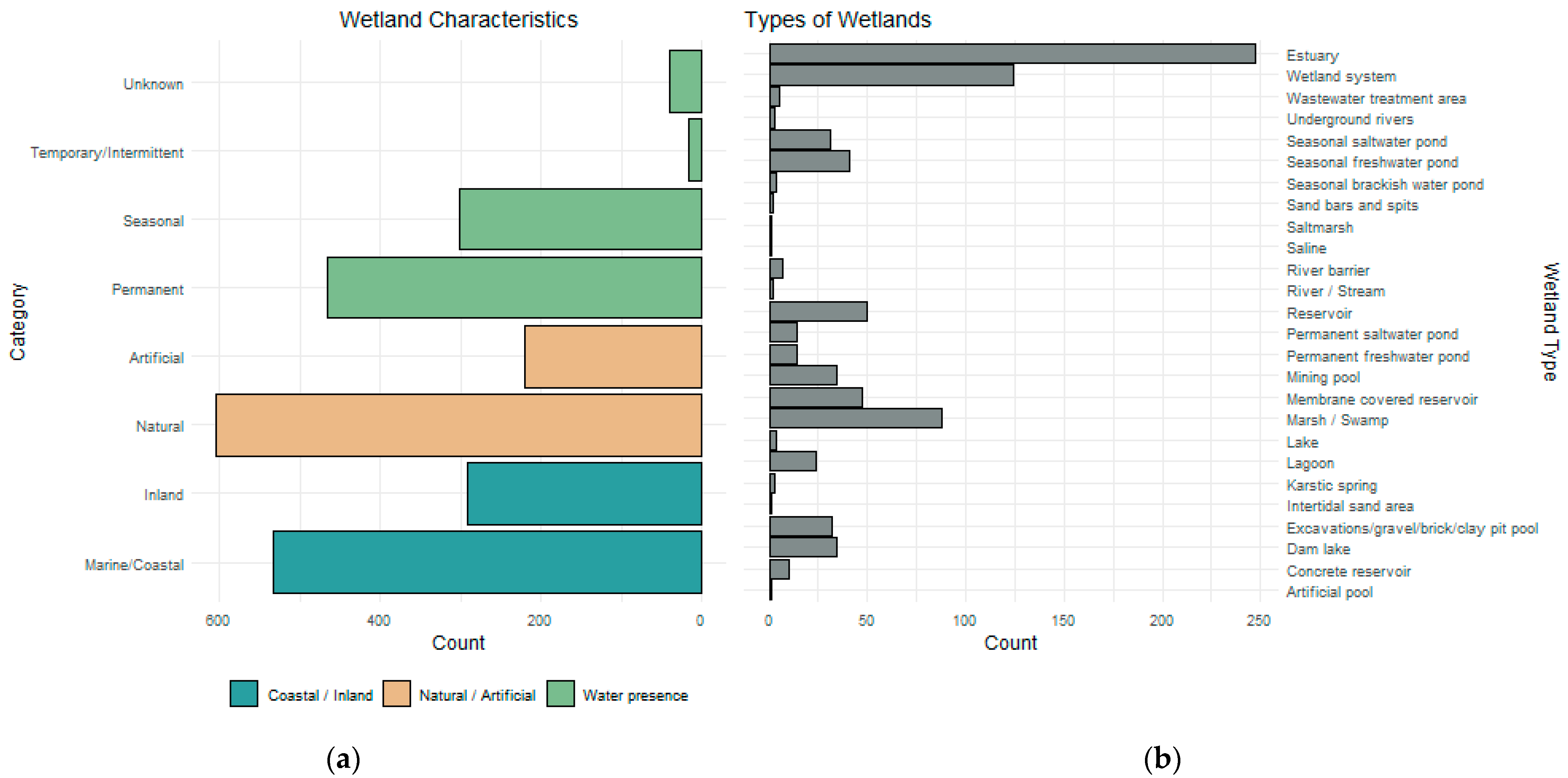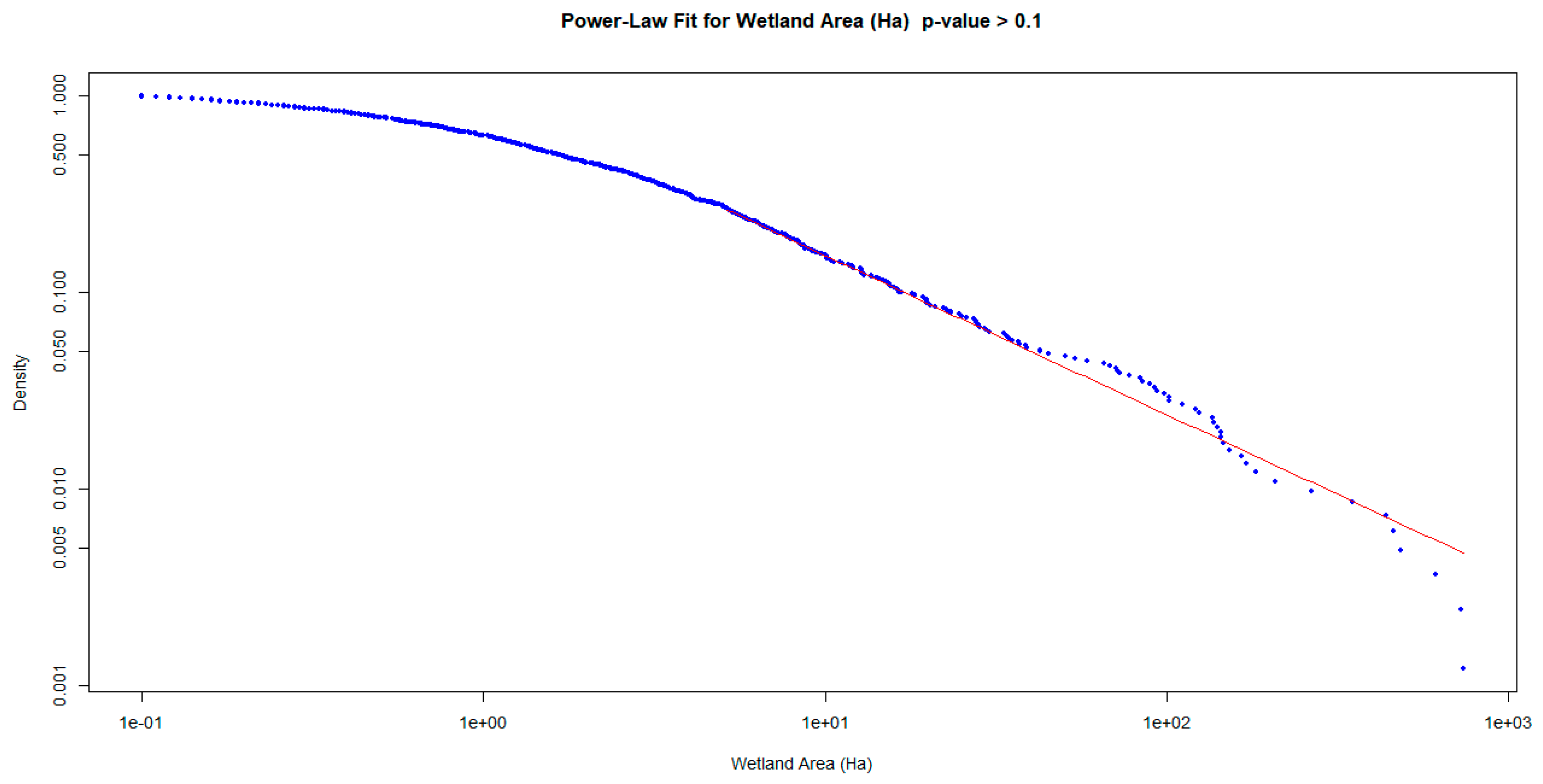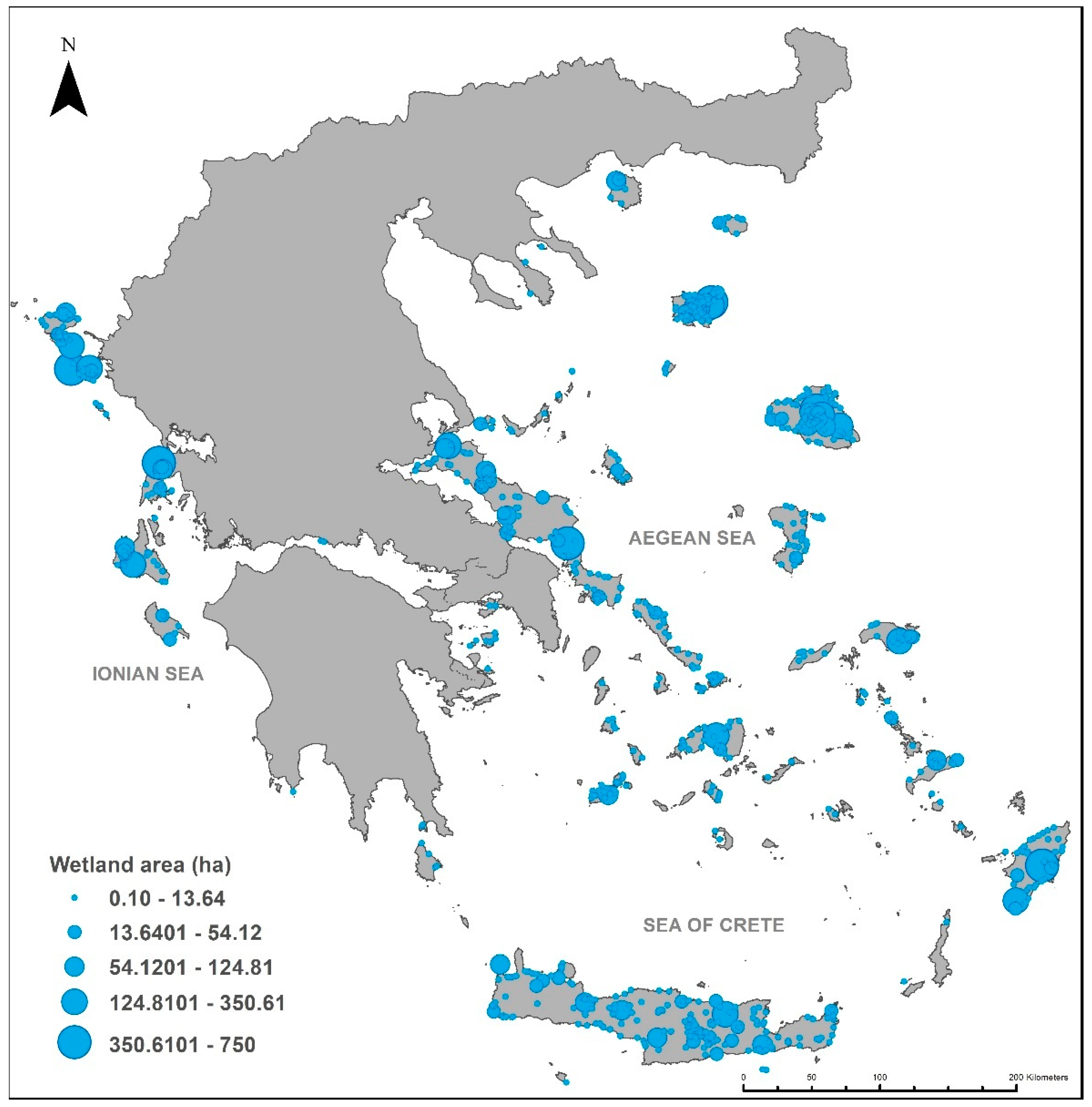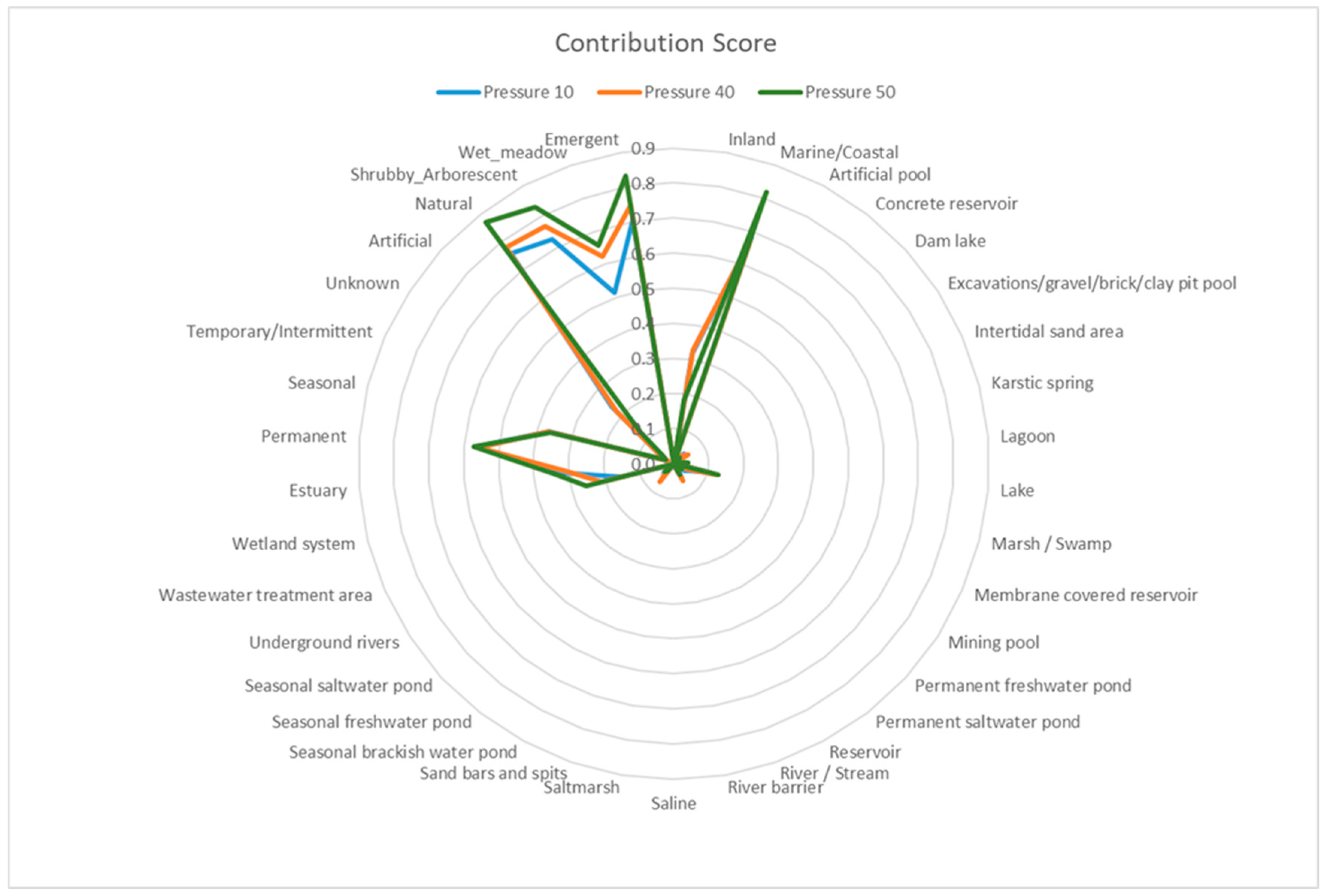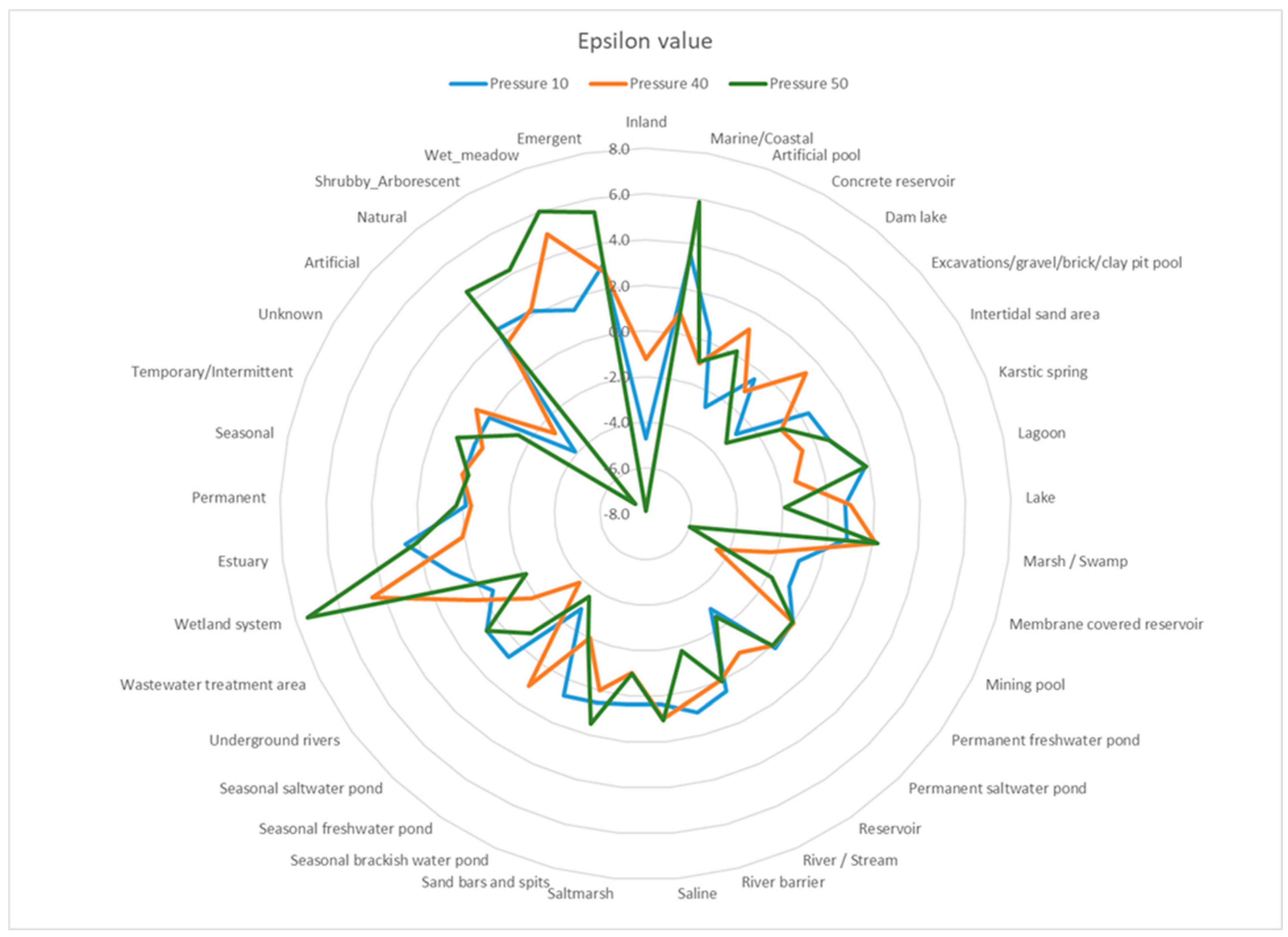Abstract
This research aims to provide guidelines using probabilistic methods to understand better the dominant characteristics of the 824 under-pressure wetlands on 75 islands within Greece and to inform future conservation efforts. Identifying the characteristics and types of anthropogenic pressures is crucial for developing effective conservation strategies. The study employs power-law modeling to validate the natural size distribution of wetlands, naïve Bayesian inference to model human impacts, and the epsilon statistic to assess wetland sensitivity to specific pressures, addressing potential sampling biases. Power-law modeling reveals a natural heavy-tailed distribution of wetland sizes, highlighting the ecological significance of larger, rarer systems. Naïve Bayesian inference indicates that agriculture and transportation are the predominant pressures affecting natural coastal wetlands. The epsilon statistic further differentiates wetland sensitivity, identifying estuaries, lagoons, and marshes as particularly vulnerable. By profiling the most vulnerable wetlands using these methods, the research provides a framework for assessing anthropogenic impacts and informing targeted conservation and management strategies to protect these vital ecosystems.
1. Introduction
Wetlands play a crucial role in the global ecosystem’s functioning, providing essential services such as biodiversity refugia, water filtration and supply, gas and climate regulation, and flood control [1,2,3]. Wetlands provide critical nature contributions to people (NCPs) [4], greatly exceeding their geographic extent and physical size [5]. Yet their loss is alarming since natural wetlands’ average annual loss rate is over three times faster than that of natural forests, i.e., −0.78%/year vs. −0.24%/year, respectively [6]. Since 1900 AD, we have lost approximately 64–71% of wetlands globally, making them one of the most endangered ecosystems in Earth’s recent history [7].
The proximate causes and underlying forces contributing to wetland conversion and degradation are generally similar worldwide [8], but their impacts are unevenly distributed across different regions [9]; human activities, such as agricultural development, infrastructure construction, industrial operations, and urbanization, predominantly drive changes. These influences are collectively called anthropogenic threat complexes (ATCs), characterized by various sets of drivers that differ in intensity [9]. As the modernization transition advances at both national and regional levels, influenced by states’ economic development programs to reshape the political economy of countries [10,11], variations in the targeted types of wetlands become evident, such as differences between inland vs. coastal wetlands [7].
These areas enrich species diversity in numerous island environments [12]. They often harbor endemic species [13] and play a crucial role in bird migration (see Figure 1) [14,15,16]. Most institutional weaknesses and deficiencies identified in the massive literature regarding the actual implementation of the Natura 2000 network across Europe [17,18,19,20,21,22,23] apply to their conservation processes. These wetlands are part of complex social–ecological systems and land use mosaics, which makes them susceptible to increased pressures from infrastructure and activities further exacerbated by tourism growth [14,15,16,17,18,19,20,21,22,23,24,25,26,27]. Past losses of Mediterranean wetlands were estimated to represent c. 50% over the 20th century, most since the 1970s [17]. In parallel, during the last 50 years, wetland-dependent species populations have declined by 81% [28].
The Mediterranean Basin is recognized as one of the world’s biodiversity hotspots [29]. Greece houses a remarkable share of this diversity in the east Mediterranean due to processes and patterns involved in modern-day biota’s arrival and settlement and anthropogenic pressures’ history [30]. In Greece, a protected area network comprises 202 Special Protection Areas (SPAs), established under the EU Birds Directive, and 241 Special Areas for Conservation (SACs), designated under the EU Habitats Directive (total area of 4,294,960 ha). Together, these protected areas form the European Union’s Natura 2000 network in the country, covering 4,294,960 ha, which accounts for 27.3% of the national territory and 6.1% of territorial waters [31]. This results in a high sufficiency index of protected area coverage of 99.07 out of 100 [32]. One might be tempted to view the Natura 2000 network as a “rosy” cornerstone of biodiversity conservation in Greece within the European framework. However, it is essential to recognize that, despite these impressive numbers at first glance, the approximately 400 protected areas, initially selected mainly by experts in taxonomy and systematics, have an average size of about 13,000 ± 21,000 ha. The smallest area measures 1.31 ha, while the largest exceeds 200,000 ha. Additionally, the selection process did not prioritize aspects such as complementarity and connectivity between areas, threats to natural features, and relationships between different human uses. As a result, these figures present significant and often complex challenges for conservation planning [33], usually leading in practice to downgrading, downsizing, and de-gazettement of protected areas [34].
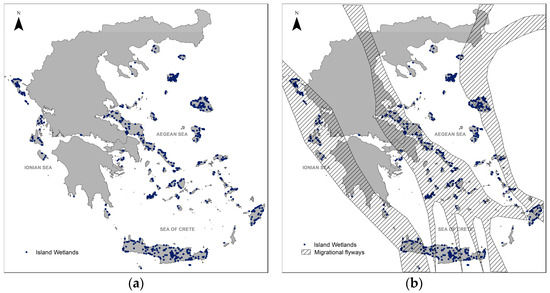
Figure 1.
(a) shows the geographical distribution of wetlands in the Greek islands, particularly in the Aegean Archipelago. (b) illustrates the major Balkan–Cyrenaic flyways constructed after the available literature [35]. This figure serves as a straightforward proxy representation of the significance of island wetlands in the context of a global ecological phenomenon: bird migration.
Figure 1.
(a) shows the geographical distribution of wetlands in the Greek islands, particularly in the Aegean Archipelago. (b) illustrates the major Balkan–Cyrenaic flyways constructed after the available literature [35]. This figure serves as a straightforward proxy representation of the significance of island wetlands in the context of a global ecological phenomenon: bird migration.
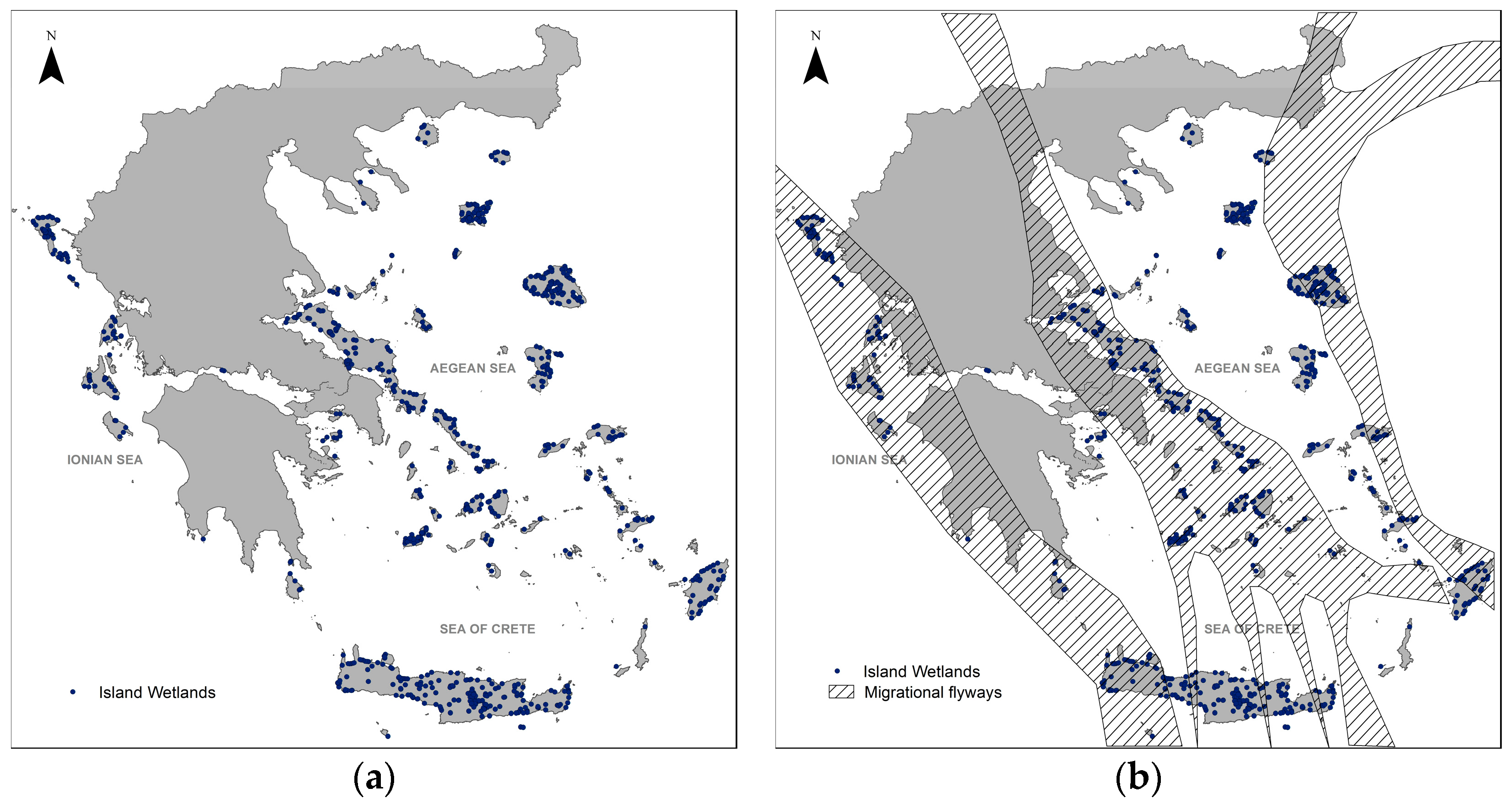
Most of these protected areas consist of wetlands with a unique “triple” insularity characteristic, which refers to the three overlapping isolation layers. This means they are:
(1) (often) protected “water bodies” (2) surrounded by irregulated land uses and (3) on islands and islets. Notable examples are (1) the 25 wetlands of Lesbos, (2) Western Milos, Antimilos, and Polyaigos, (3) the isle of Elafonissi and coastline of Crete, (4) the coastline of Samothrace, (5) Eastern Astypalea and the surrounding islets, (6) Aliki and Chortarolimni lakes on Lemnos, or (7) the islands of Oinousses.
The extensive drainage of wetlands on the Greek mainland is intricately connected to the evolution of the modern Greek state from 1830 to the present [11,28,36,37,38,39]. Island wetlands in Greece gained significant recognition after the WWF’s multiannual research program “Conservation of the Island Wetlands of Greece”. This initiative led to the discovery and documentation of over 800 wetlands on 75 islands in the Aegean and the Ionian Archipelagos [40]. As a result, a Presidential Decree was signed in June 2012 to provide strict protection for 380 of Greece’s small (<8 hectares) natural island wetlands.
The islands of the Aegean Archipelago are particularly vulnerable due to their fragmented nature, small size, and the high density of human activities in coastal areas [40,41]. In addition to these local challenges, they face broader global issues such as climate change and biological invasions [42,43,44]. Although there is a growing body of research on wetland conservation within the Mediterranean region, quantitative studies focusing specifically on the Aegean Islands are still limited [45]. Most research has primarily concentrated on the fauna and flora rather than investigating the geomorphological changes and habitat alterations caused by human activities.
This contribution focuses on the biodiversity-rich wetlands of the Aegean Archipelago and addresses the challenges associated with conservation planning in these setups. These ecosystems are characterized by their triple insularity, resulting in physical boundaries that affect biodiversity patterns and processes, human usage, governance, and various threats. This triple insularity also offers conservation planners a specific set of objectives, constraints, and opportunities that can enhance the effectiveness of conservation planning strategies [46]. We propose that identifying groups of wetlands based on the interaction and co-occurrence of their ecosystemic traits, alongside the complexities of anthropogenic pressure complexes, could improve the cost efficiency of conservation operations [47]. By categorizing wetlands into groups, planners might develop general master plans for each group and then tailor these plans to address the needs of specific cases. Such a “strategy” should (1) facilitate adaptive management, allowing for updating the probability of different outcomes as new data become available, rendering more flexible and responsive conservation plans; (2) integrate various sources of data (e.g., environmental variables, pressures presence/absence); (3) help in assessing the risks associated with different conservation actions, considering both the likelihood of success and the potential consequences of failure; (4) allow the use and incorporation of prior information, which can be particularly useful when data are scarce; (5) quantify uncertainty in model predictions [46,48,49,50,51,52,53].
This study’s main contribution is applying a probabilistic framework to quantify and rank the impact of different anthropogenic activities on the Aegean Islands’ wetlands [31]. By systematically analyzing how proximity to urban centers, wetland size, and landscape fragmentation influence the intensity of human pressures, we seek to identify the specific characteristics that make certain wetlands more susceptible or vulnerable to degradation [54]. Such insights are essential for bridging the gap between localized ecological observations and broader regional conservation needs [43].
We employ naïve Bayesian inference to evaluate how different characteristics of wetlands—such as location, type, and size—contribute probabilistically to the likelihood of experiencing human pressures such as (1) urbanization, (2) agricultural expansion, and (3) urban fabric development [55]. The use of Bayesian inference enables a comprehensive analysis of how multiple factors shape the resilience of wetland ecosystems under increasing human pressures, as well as the contributions of each characteristic to the observed outcomes [52,56]. Bayesian models are particularly well-suited for ecological studies because they integrate prior knowledge with new data, refining predictions as more information becomes available [53,57]. This ability to adapt makes Bayesian inference a valuable tool for wetland management, as it facilitates continuous updating and adjustment of conservation strategies based on the latest data [58]. In this regard, they align with the properties of the abovementioned conservation planning strategy. This study addresses these gaps by combining power-law modeling and Bayesian inference to analyze anthropogenic pressures on wetlands in the Aegean Archipelago. Specifically, we aim to identify pressure-sensitive wetland types and propose targeted conservation strategies to mitigate human impacts.
2. Materials and Methods
2.1. Wetland Data and Profile Building
We utilize the public domain database Ygrotopio Islands developed by the WWF (https://www.ygrotopio.gr/general/search.php?lang=en&action=map&action=export#, accessed on 17 November 2024) [59], which contains data on 824 wetlands across 75 islands. These data have been part of a national inventory of Greek wetlands since 1980. The dataset includes 37 key characteristics that describe various aspects of each wetland. These characteristics encompass the nature of the wetland (e.g., natural or artificial), water presence (seasonal, permanent, temporary/intermittent, unknown), location (inland, marine/coastal), and the area in hectares, ranging from 0.1 to 750 hectares (see Appendix A). Additionally, wetlands were classified into specific types: sand bars, seasonal freshwater ponds, underground rivers, and estuarine systems. Prevalent vegetation types were also documented, including shrubby arborescent species, wet meadow grasses, and emergent aquatic plants. These data were georeferenced to latitude and longitude coordinates, allowing for precise mapping of wetland locations within the study area. Furthermore, the database outlines each wetland’s property and protection status, human activities, and intensity within each wetland, as well as its catchment area (percentage remaining untouched). The data can be accessed and linked through polygon pop-ups in WWF Greece’s mapping application. The profiles built using this comprehensive set of characteristics serve as the basis for subsequent analysis of how different anthropogenic pressures impact wetland types.
2.2. Human Activity and Anthropogenic Pressure Data
In the context of islands, the proximity of many wetlands to human settlements and economic activities renders them particularly susceptible to anthropogenic pressures. Using the WWF Ygrotopio database [35], we identified and categorized significant pressures impacting each wetland [60]. Table 1 presents these categories, encompassing broader human activities such as tourism and leisure and their effects on wetland systems. These categories are valid proxies for understanding wetlands’ most significant anthropogenic threats. Three categories will serve as our focal point as they provide the most essential explanatory power about human activity: agriculture and forestry (code: 10), urbanization (code: 40), and transportation and communication (code: 50)

Table 1.
Categories of types and anthropogenic pressures used in the WWF Ygroscopio database for wetlands in the Aegean Islands.
All the collected data (Section 2.1 and Section 2.2) are point-based, providing specific geographic coordinates for each island wetland and its associated human activities. This allowed for precise spatial analysis of the relationship between wetland characteristics and human pressures. The spatial analysis was conducted using GIS software (ArcGIS 10.8.1), which enabled the visualization of wetlands and the overlapping types of activities across the Aegean Islands. This approach revealed areas where wetlands are most at risk of degradation due to nearby economic activities [39].
2.3. Statistical Analysis
We present statistical methods addressing two key issues introduced earlier: (1) whether the frequency–size relationships of the Aegean Islands’ wetlands deviate from heavy-tailed power laws due to anthropogenic pressures; (2) the potential patterns of co-occurrence between individual wetland traits and anthropogenic pressures applied to each of them.
2.3.1. Power-Law Distribution of Frequency–Size Relationship of Islands’ Wetlands
The literature indicates that the power law and associated thresholds, representing the frequency–size distribution of wetlands, reflect the state transition dynamics of these ecosystems. They can be used to evaluate the intensity of anthropogenic disturbances [61]. The key point is that the log–log frequency–size distribution may exhibit vanishing tails and narrower spans and tends to behave as a normal or lognormal distribution [62]. However, given an island’s geophysical delimitation, one should notice that such a distribution is de facto upper truncated [63]. This observation raises the hypothesis that the wetlands of the Aegean Islands might be on a path toward conversion or elimination. Alternatively, they may be experiencing anthropogenic degradation. It is important to note that the lo–log frequency–size distribution could arise from various causes, and further analysis is required to determine the relative contribution of anthropogenic factors compared to natural processes. If this is the case, anthropogenic pressure implies that the current legal protection policies are either insufficient or poorly implemented.
Mathematically, a power-law distribution follows the form , where P(x) is the probability of observing a wetland of size x and α is the scaling exponent that characterizes the distribution. This relationship would indicate that more extensive wetlands are exponentially less frequent than smaller ones, aligning with known patterns in natural phenomena, such as river networks, wildfires, species abundance distributions, or earthquake magnitudes [64,65,66,67]. To assess the reliability of the power-law fit, a goodness-of-fit (GoF) test is performed using the Kolmogorov–Smirnov (KS) test alongside bootstrap simulations.
2.3.2. Inferring the Relationship Between the Co-Occurrence of Wetlands and Anthropogenic Pressures
We follow the method extensively analyzed by Stephens et al. [51], adapting it to the specific characteristics of the current case by focusing on co-occurrences in space rather than time. The wetlands of the islands define a set, W, of individual units, Wi, such that . These units form the partitioned wetland ensemble of the Aegean Archipelago region, denoted as A.
We analyze two objects/observables, E and H, for each wetland and consider n(E) and n(H) representatives of each type. An object/observable of type E, Ee(Wi) is an individual wetland in A; it is a Boolean variable, meaning it can be present or absent in wetland Wi. In other words, e ∈ [1, …, ne], meaning the number of discrete categories into which the object E has been divided. The same applies to type H, divided into h discrete categories.
The number of co-occurrences of Ee and Hh in W, within A, is given by “counting” the frequencies (dropping for simplicity e and h)
If the indicator function I = 1 ⇔ E and H co-occur in the wetland Wi. Given N(EH), the probability of a co-occurrence P(EH) = N(EH)/W, and the conditional probabilities P(E|H) = P(EH)/NH and P(H|E). We may take P(E|H) and P(EH) as measures of the degree of co-occurrence of E and H types.
Bayesian inference was employed to model the probability of different wetland types experiencing anthropogenic pressures based on their characteristics. The Bayesian framework is particularly suitable for the present study, allowing for incorporating prior knowledge and handling uncertainties in the data [55,68]. Under the naïve assumption that all variables are independent, the core of the naïve Bayesian approach is expressed by the following equation:
where:
- P(H|E) is the posterior probability that a wetland is subject to a particular human pressure given its characteristics.
- P(E|H) is the likelihood, representing the probability of observing specific wetland characteristics if the pressure is present.
- (H) is the prior probability of the wetland being under pressure before observing the evidence.
- P(E) is the marginal likelihood, representing the total probability of the evidence across all hypotheses.
The model treats each characteristic—such as wetland type, size, and location—as independent predictors of the likelihood of a wetland experiencing one of the three key pressures. For example, coastal wetlands near urban centers are more likely to experience pressures related to urbanization and transport than remote inland wetlands primarily affected by agricultural practices.
In ecological modeling, especially when integrating multiple data types such as wetland characteristics and anthropogenic pressures, one of the key challenges is accounting for variations in data sample sizes across different wetlands [43,49,50]. The presence or absence of pressures in wetlands can be influenced by the size and density of observations, leading to potential biases in probabilistic models. To address this issue, we utilize the epsilon (ε) statistic, which measures the strength of association between wetland characteristics and specific human pressures while adjusting for differences in sample sizes across the dataset [69].
The epsilon statistic (ε) quantifies the deviation from a null model where the distribution of pressures is assumed to be random, providing a standardized score that can be interpreted as a measure of statistical significance. The formula for calculating ε is provided, where is the epsilon statistic, to evaluate whether the presence of a particular human pressure Hh (e.g., urbanization) is associated with a given wetland characteristic Ee (e.g., coastal wetland, specific vegetation):
- is the epsilon statistic, which now evaluates whether the presence of a particular human pressure Hh (e.g., urbanization) is associated with a given wetland characteristic Ee (e.g., coastal wetland, specific vegetation).
- represents the number of wetlands where both the human pressure Hh and the characteristic Ee are observed. This essentially counts how often both conditions coincide (i.e., the number of wetlands that both have the pressure and the characteristic), .
- is the total number of wetlands where the characteristic Ee is present, regardless of whether the human pressure Hh exists.
- is the prior probability of a wetland being subject to human pressure Hh across all wetlands in the dataset. It is calculated as:
The epsilon statistic ε serves as a standardized score that compares the actual occurrence of a specific wetland characteristic under pressure to what would be expected if the pressure were randomly distributed across the study area [50]. Its value can be interpreted as follows:
ε > 0: A positive epsilon value indicates that the wetland characteristic Εe (such as a coastal location or large area) is positively associated with the occurrence of the pressure Hh. This means the pressure is more likely to occur in wetlands with this characteristic than expected by chance. For example, a high positive epsilon value for coastal wetlands experiencing tourism-related pressures suggests a significant association between coastal location and the likelihood of experiencing impacts from tourism.
ε < 0: A negative epsilon value indicates a negative association between the wetland characteristic and pressure. This suggests that the pressure occurs less frequently than is expected in wetlands where the characteristic Ee is present. For instance, a negative epsilon value for inland wetlands concerning urbanization pressure may imply that these wetlands are relatively less impacted by urbanization compared to coastal wetlands.
ε = 0: An epsilon value close to zero suggests that the presence of the characteristic has no significant association with the occurrence of the pressure. This implies that the pressure distribution is similar to what would be expected under random conditions.
This study calculated the epsilon statistic for each combination of wetland characteristics (such as wetland type, size, or vegetation type) and the three primary anthropogenic pressures: agriculture, urbanization, and transportation. By comparing the epsilon ε values across different characteristics, we could rank the predictors based on their strength of association with the pressures.
3. Results
3.1. Wetlands Profiling
The studied wetlands were classified based on three key characteristics: inland vs. marine/coastal wetlands, natural vs. artificial wetlands, and the presence of water (duration/year). The classification results, shown in Figure 2, indicate that the most common type of wetland in the Aegean Islands is natural coastal wetland with permanent water. However, various other combinations are also observed, reflecting the diversity of wetland types in the region. This diversity is further illustrated in Figure 3, which presents the absolute frequencies of wetland types across the Aegean Archipelago.
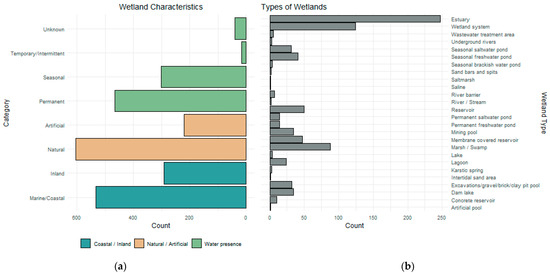
Figure 2.
(a) Major categories of wetlands in the Aegean Archipelago islands, in absolute frequencies per case. (b) Absolute frequencies of wetland types in the Aegean Archipelago wetlands.
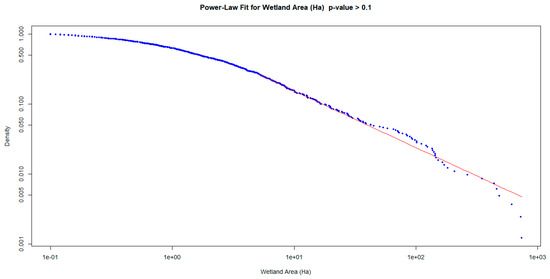
Figure 3.
Aegean Archipelago wetlands(blue points) frequency–size distribution fitted to a power-law model (red line). Estimated scaling parameter (α) = 1.81 and the corresponding minimum value (xmin) = 4.66 hectares.
These results provide an overview of the wetland types analyzed in subsequent sections and form the basis for exploring patterns and pressures affecting these ecosystems.
3.2. Power-Law Distribution and Validation
The fitting process for the distribution of wetland areas aimed to determine whether the size–frequency distribution of the Aegean Archipelago wetlands follows a power-law behavior. This behavior suggests a natural, self-organizing system commonly observed in ecological distributions. The power-law fitting yielded an estimated scaling parameter (α) of 1.81 and a corresponding minimum value (xmin) of 4.66 hectares (Figure 3). These values indicate that the power-law relationship holds for wetland areas larger than 4.66 hectares. This suggests that the distribution of wetland areas exhibits a heavy-tailed pattern, where larger wetlands are increasingly rare yet follow a predictable scaling law.
The fractal dimension was calculated as a key indicator of the complexity and spatial structure of the island’s wetlands. It was computed using the formula Df = 2 − α = 0.189. This low fractal dimension indicates a relatively sparse distribution of larger wetlands compared to smaller ones. This supports the hypothesis that larger wetlands are less frequent, yet their presence significantly influences the overall dynamics of the system. The p-value obtained from KS testing was 0.416, which exceeds the standard significance threshold of 0.05. This indicates that the power-law model adequately represents the distribution of the studied wetland areas, indicating no significant evidence against the hypothesis that the data follow a power-law distribution. Figure 4 illustrates the Aegean islands’ wetlands network using binning relating to this power law.
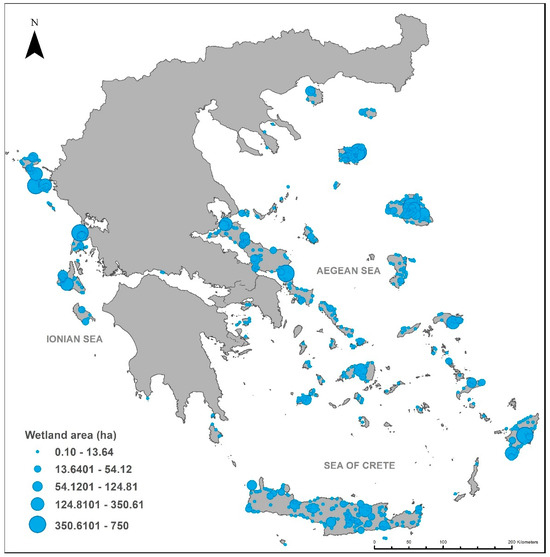
Figure 4.
Representation of the wetlands network in the Aegean Archipelago reflecting the power-law binning. See text for details.
3.3. Bayesian Inferences
A naïve Bayesian model was applied to assess the likelihood of different anthropogenic pressures affecting wetlands in the Aegean Islands. The focus was on three main pressures: agriculture and forestry (code: 10), urbanization (code: 40), and transportation and communication (code: 50). The analysis involved 618 samples and employed 10 predictor variables related to wetland characteristics such as location, type, and size. Model evaluation metrics were applied to assess the model’s performance for each type of pressure, including accuracy, kappa, sensitivity, specificity, and confusion matrices. The results for each pressure type are presented below, emphasizing the model’s predictive capabilities, key findings, and limitations.
3.3.1. Pressure 1: Agriculture and Forestry (10)
The naïve Bayes model for agriculture and forestry pressure revealed a significant class imbalance. In the dataset, 87.7% of the training samples and 87.8% of the testing samples were labeled as experiencing this type of pressure (TRUE). This imbalance indicates that most wetlands in the dataset are affected by agricultural and forestry activities, making it difficult for the model to predict the minority class (FALSE) accurately.
Model Performance:
Cross-validation was conducted using kernel smoothing, resulting in a model accuracy of 78%, compared to 59% without smoothing. Although this accuracy seems relatively high, the kappa statistic was low, approximately 0.137, suggesting that the model’s predictions were only slightly better than random chance.
- -
- Confusion matrix analysis:
- The model successfully identified 153 instances of TRUE pressure but had difficulty predicting the minority class, with only five correct predictions for FALSE.
- There were 27 false negatives (instances where TRUE was incorrectly predicted as FALSE) and 20 false positives (instances where FALSE was predicted but the true class was TRUE).
- The method exhibited low sensitivity for FALSE (20%) and high specificity for TRUE (85%), indicating it performed well in identifying the more common TRUE cases but struggled to identify wetlands not impacted by agricultural and forestry activities.
An imbalance in the dataset significantly impacted the model’s effectiveness in identifying wetlands affected by agricultural and forestry pressures. This imbalance resulted in a high prediction rate for the TRUE class, while many FALSE cases were overlooked, as indicated by the low sensitivity and poor precision for FALSE cases (15.6%). Although the model can provide valuable insights into which wetlands are most affected by agricultural practices, it lacks reliability in detecting those unaffected. In terms of conservation, the model is useful for pinpointing areas severely impacted by agriculture and forestry. However, its limited ability to detect the absence of such pressures could lead to an underestimation of areas that may seem unaffected but are still experiencing subtle ecological impacts.
3.3.2. Pressure 2: Urbanization (40)
The analysis of urbanization pressure revealed a more balanced dataset, with 49.35% of the training set labeled as FALSE and 50.65% labeled as TRUE. Similar proportions were found in the testing set. This balance enabled the naïve Bayes model to perform without a significant bias toward either class.
Model Performance: The cross-validated model using kernel smoothing achieved an accuracy of 54.68%, slightly better than the 52.59% accuracy without kernel smoothing. However, the kappa value was 0.0980, indicating limited predictive power and only slight agreement beyond random classification.
- -
- Confusion matrix analysis:
- The model accurately predicted 65 cases as FALSE and 57 as TRUE, demonstrating a relatively balanced ability to identify both classes.
- There were 47 false negatives (TRUE cases misclassified as FALSE) and 36 false positives (FALSE cases misclassified as TRUE).
- The sensitivity for the FALSE class was 64.36%, indicating that the model was more effective at identifying wetlands not affected by urbanization compared to those affected.
- The specificity for the TRUE class was lower, at 54.81%, suggesting that the model had more difficulty detecting cases of urbanization pressure.
The balanced nature of the dataset allowed the naïve Bayes model to perform reasonably well. However, the low kappa value indicates the model’s unreliable predictions. The results suggest that while the model can distinguish between urbanized and non-urbanized wetlands, it may overlook subtle land use changes that signal early stages of urban development. The model’s ability to identify wetlands under urban pressure could be valuable for urban planning and management, especially in areas undergoing rapid development. Nonetheless, improvements to the model—potentially by incorporating additional predictors or exploring alternative modeling techniques—are necessary to enhance its reliability for more nuanced conservation decision making.
3.3.3. Pressure 3: Transportation and Communication (50)
The dataset for transportation and communication pressure was balanced, with the training set consisting of 52.1% labeled as FALSE and 47.9% labeled as TRUE. This balance created a fair foundation for the naïve Bayes model to distinguish between the two classes effectively.
Model performance:
By utilizing kernel smoothing, the model achieved an accuracy of 69.75%, an improvement over the 67.96% accuracy obtained without smoothing. The kappa statistic increased to 0.3911 with kernel smoothing, indicating a moderate agreement between the predicted and actual values.
- -
- Confusion matrix analysis:
- The model accurately classified 42 instances as FALSE and 28 as TRUE. However, it also exhibited many false negatives (TRUE instances classified as FALSE) and false positives (FALSE instances classified as TRUE).
- The sensitivity for detecting TRUE cases was 60.75%, while the specificity for identifying FALSE cases was 71.43%. This indicates that the model was more effective at recognizing wetlands unaffected by transportation activities than those impacted.
The naïve Bayes model performed relatively well compared to previous assessments, with improved kappa and balanced accuracy scores. However, it still faced challenges distinguishing subtle differences in transportation-related activities that may impact wetland conditions. The sensitivity and specificity metrics suggest that while the model can effectively identify areas with transportation pressure, it might overlook some regions where such activities are less evident but still significant.
These results are valuable for evaluating transportation infrastructure’s effects on coastal and inland wetlands. This assessment can help inform strategies to mitigate negative impacts, such as pollution and habitat fragmentation. Nevertheless, the model could be enhanced through additional tuning and by incorporating more detailed spatial data to improve its predictive performance regarding transportation pressures.
3.3.4. Summary of Model Results
The naïve Bayes model demonstrated varying levels of predictive accuracy and reliability across the three types of anthropogenic pressures (see Table 2). It performed best with the more balanced datasets, specifically urbanization and transportation, where the class distribution allowed for a more equitable assessment of TRUE and FALSE cases. In contrast, the model for agricultural pressure, which was affected by class imbalance, achieved a high accuracy overall but struggled to detect the minority class. This highlights the importance of addressing dataset imbalances. Low kappa values across all pressures indicated that while the model could predict the majority class, its overall reliability was limited. This suggests a need for further refinement of the model. Contribution scores produced by the naïve Bayes model showcase little fluctuations between pressures, highlighting specific wetland characteristics throughout the three. The ε value, however, provides more variety across the pressures, highlighting several different wetland characteristics with high values.

Table 2.
Summary of naïve Bayes model predictive accuracy and reliability across the three types of anthropogenic pressures.
4. Discussion
The results of this study offer valuable insights into the distribution and vulnerability of wetlands in the Aegean Islands, particularly concerning three key anthropogenic pressures: agriculture, urbanization, and transportation. By utilizing power-law modeling and naïve Bayesian inference, this research lays the groundwork for understanding how these pressures affect wetlands of varying types and sizes. Applying the epsilon statistic also enables a more detailed evaluation of how different wetland characteristics relate to specific pressures. Below, we discuss the implications of the findings, identify areas for improvement, and highlight the novelty of this research within the context of existing studies.
The power-law fitting demonstrated that the distribution of wetland sizes follows a natural heavy-tailed pattern, with smaller wetlands being much more frequent than larger ones [65,67]. This result supports the hypothesis that wetland areas are self-organizing and shaped by natural ecological processes, such as hydrological and geomorphological factors, rather than by artificial or random influences [70,71]. The fractal dimension of 0.189 further reinforces the idea that larger wetlands, while rare, play a critical role in the overall ecological dynamics [2,50]. The similarity to the power-law model (p-value = 0.416) supports the dataset’s validity, confirming that the observed distribution reflects naturally occurring processes and enhancing confidence in its reliability [61,72].
This finding is significant since power-law distributions are often associated with robust ecological systems. In these systems, smaller components, such as smaller wetlands, comprise the majority, while larger components, like larger wetlands, play crucial ecological roles. These roles include acting as biodiversity hotspots and regulating water [1,73]. Power-law dynamics have been applied in various ecological and hydrological contexts to analyze the distribution of natural resources and environmental disturbances [74,75]. Future research could build on this by examining how human activities might disrupt this natural balance, particularly if such pressures lead to a disproportionate loss of large or small wetlands [74].
Bayesian models are particularly well-suited for ecological studies because they integrate prior knowledge with new data, refining predictions as more information becomes available [53,57]. This ability to adapt makes Bayesian inference a valuable tool for wetland management, as it facilitates continuous updating and adjustment of conservation strategies based on the latest data [58]. The results of the naïve Bayes model reveal important patterns regarding the impact of various pressures on wetlands in the Aegean Islands. However, they also highlight some limitations in the model’s performance. The model achieved high accuracy rates for agricultural and transportation pressures, 78% and 69.75% respectively. However, these accuracy figures were accompanied by low kappa values, indicating that while the model effectively predicts the majority class, it struggles to accurately identify the minority class or false cases [69,74]. This limitation is particularly evident in the agriculture model, where significant class imbalance led to skewed predictions favoring wetlands under agricultural pressure, reducing the model’s ability to identify wetlands unaffected by this pressure [76] accurately.
The urbanization model, which used a more balanced dataset, demonstrated moderate performance with a kappa value of 0.0980. However, its overall effectiveness was still weak. This indicates that while the model can distinguish between impacted and non-impacted wetlands, it struggles to identify subtle land use changes and the effects of early-stage urbanization [56,77]. This emphasizes the need to refine the model, especially by addressing class imbalances and potentially incorporating more complex interactions among predictor variables [78]. The results suggest that while the naïve Bayesian approach offers a useful starting point for understanding human impacts on wetlands, it could be improved by utilizing more advanced methods, such as random forests or support vector machines. These techniques better handle imbalanced data and capture non-linear relationships between variables [79,80]. Additionally, more detailed spatial and temporal data could enhance the model’s predictive capabilities, particularly for identifying emerging pressures in urbanizing areas [81].
The epsilon analysis provided valuable insights into how different types of wetlands respond to various human pressures. Positive epsilon values for wetlands such as estuaries, lagoons, and coastal marine systems—particularly under agricultural and transportation pressures—indicate that these wetlands are either resilient to or significantly affected by human activities [43]. In contrast, freshwater ponds and inland wetlands showed strong negative epsilon values, highlighting their vulnerability to anthropogenic pressures [60]. These findings underscore the differing responses of various wetlands to human impacts, emphasizing the need for tailored conservation strategies [82].
The ability of epsilon to quantify associations is a novel application in wetland conservation, offering a more detailed understanding of which wetlands are at the greatest risk [31]. This approach enables the prioritization of conservation efforts based on the pressure level faced and the ecological significance of specific wetland types [83]. Future research could further enhance this method by examining temporal trends in epsilon values, providing insights into how wetland vulnerability changes as human pressures increase over time [84,85,86].
This research aimed to provide guidelines using probabilistic methods to understand the dominant characteristics of current under-pressure wetlands and to inform future conservation efforts. Identifying the characteristics and types of anthropogenic pressure that attract interest is invaluable for developing effective conservation strategies. By analyzing this information, we can construct a profile for each of the three pressures we have focused on, utilizing the highest contribution scores and the largest positive epsilon values.
Through the naïve Bayes analysis, the contribution scores have yielded highly similar results across all pressure types. It was found that the wetlands under pressure are predominantly natural wetlands located in coastal areas with a permanent water presence and various types of vegetation. All three examined vegetation types produced high scores (Figure 5).
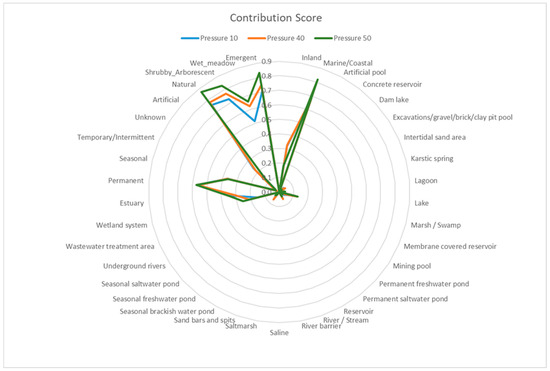
Figure 5.
Spider chart that illustrates the score contributions of various wetland characteristics to the likelihood of three specific pressures: Agriculture and Forestry (indicated in blue), Urbanization, Industrialization, and Similar Activities (indicated in orange), and Transportation and Communication (indicated in green). The score contributions are relatively similar, highlighting the significance of particular characteristics concerning these pressures.
This consistency throughout the pressure types may signify that these are overall targeted characteristics for agriculture, urbanization, and transport expansion. However, this conclusion is somewhat foreseeable, and to remedy this, we turn to the calculated epsilon values, as the method bypasses the problem that may be caused by sample size and variable frequency.
Positive epsilon values showcase more specific characteristics that may indicate the unique vulnerabilities of these ecosystems under different pressures. For agricultural pressure, marine/coastal wetlands have the highest epsilon value (3.47), accompanied by characteristics showcasing elevated probability through the naïve Bayes analysis—natural wetlands with emergent or shrubby arborescent vegetation.
Estuaries and lagoons exhibit significant sensitivity to agricultural activity, with epsilon values of 2.58 and 1.83, respectively. This sensitivity is likely due to their transitional nature between land and sea (Figure 6). In urbanization, wetland systems characterized as type wetlands have an epsilon value of 4.521, while marsh/swamp-type wetlands show an epsilon value of 2.127. Additionally, wetland systems demonstrate a notable epsilon value of 7.48 under transportation pressure, indicating extreme susceptibility to high-pressure levels. This is likely linked to intense human interference, such as urbanization or industrial development. Wet meadows follow closely behind with an epsilon value of 6.03, further underscoring that these systems are highly at risk.
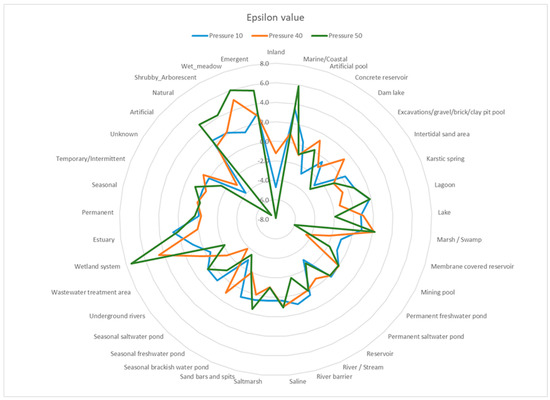
Figure 6.
Spider chart that illustrates the epsilon values for each examined wetland characteristic in relation to the probability of three pressures: blue indicates pressure 10 (Agriculture and forestry), orange indicates pressure 40 (Urbanization, industrialization, and similar activities), and green indicates pressure 50 (Transportation and communication). The epsilon values show varying but comparable levels, highlighting the significant influence of specific characteristics on the likelihood of pressure presence.
Novel Contributions and Areas for Improvement
This research makes several novel contributions to the field of wetland conservation and ecological modeling:
- Integration of Power-Law Modeling: The study effectively uses power-law distribution analysis to validate the natural distribution of wetland areas. This novel approach offers a robust statistical framework for validating wetland data and can be applied to other ecological datasets.
- Application of Naïve Bayesian Inference: The application of naïve Bayes to model the likelihood of human-induced pressures on wetlands is a relatively unexplored area. Although this method has limitations—especially in dealing with imbalanced data—it provides a simple and interpretable framework for predicting human impact based on wetland characteristics.
- Use of the Epsilon Statistic: The epsilon statistic enables a detailed assessment of wetland sensitivity to human pressures. This allows for identifying particularly vulnerable or resilient wetlands, which can help inform more targeted conservation strategies.
There are several areas for improvement in the study:
The class imbalance in the dataset, especially regarding agricultural pressures, limited the model’s ability to predict the minority class accurately. Future work should investigate oversampling, undersampling, or synthetic data generation to balance the dataset and enhance model performance. While naïve Bayes provides a straightforward approach, more advanced machine learning models like random forests or gradient boosting could better capture complex interactions and improve predictive accuracy, particularly for subtle pressures such as early-stage urbanization.
Additionally, the study would benefit from higher-resolution spatial and temporal data, enabling a more dynamic understanding of how various pressures evolve and interact with wetland characteristics over time.
5. Conclusions
This research provides important insights into the distribution of wetlands and the human pressures they face in the Aegean Islands. By utilizing power-law modeling, naïve Bayesian inference, and epsilon analysis, the study creates a comprehensive framework for evaluating wetland vulnerability and resilience. While it does identify some limitations in the model’s performance, it also highlights opportunities for future research and improvement. Building on these findings, conservation efforts can be better designed to protect the most vulnerable wetlands from human-induced pressures. A conservation planning strategy based on general master plans for groups of wetlands with similar vulnerability and resilience, followed by specific tailoring to individual cases, as proposed and developed in the Introduction, could increase cost efficiency and effectiveness in such a complex archipelagic context.
Author Contributions
Conceptualization, methodology, supervision, writing—review and editing, A.Y.T.; software, validation, formal analysis, investigation, visualization, data curation, original draft preparation, C.M.G. All authors have read and agreed to the published version of the manuscript.
Funding
This research received no external funding.
Institutional Review Board Statement
Not relevant.
Data Availability Statement
The data supporting this study are publicly available and can be accessed from the Ygrotopio WWF database at https://www.ygrotopio.gr/general/search.php?lang=en&action=map&action=export (accessed on 16 October 2024).
Conflicts of Interest
The authors declare no conflicts of interest.
Appendix A
Summary of the 37 wetland characteristics and traits included in the analysis.
| Characteristic | Variable Type | Possible States | Stats |
| Longitude | Continuous | N/A | Mean: 24.62, Std. Dev.: 1.99 |
| Latitude | Continuous | N/A | Mean: 37.63, Std. Dev.: 1.72 |
| Coastal/Inland | Categorical | Marine/Coastal, Inland | Marine/Coastal: 532, Inland: 291 |
| Natural/Artificial | Binary | Natural, Artificial | Natural: 602, Artificial: 221 |
| Wetland Type | Categorical | Εstuary, Lagoon, Marsh/Swamp, Seasonal Saltwater Pond, | Εstuary: 247, Wetland System: 124, Membrane-Covered Reservoir: 47, Marsh/Swamp: 87, … |
| Wetland Area (Ha) | Continuous | N/A | Mean: 13.1, Std. Dev.: 56.5 |
| Water Presence | Categorical | Seasonal, Permanent, Temporary/Intermittent, Unknown | Seasonal: 300, Permanent: 456, Temporary/Intermittent: 17, Unknown: 41 |
| Shrubby/Arborescent | Binary | True, False | False: 244, True: 579 |
| Wet Meadow | Binary | True, False | False: 410, True: 413 |
| Emergent | Binary | True, False | True: 551, False: 272 |
| 10 Agricultural | Binary | True, False | True: 722, False: 101 |
| 40 Urbanization | Binary | True, False | True: 417, False: 406 |
| 50 Transportation | Binary | True, False | True: 429, False: 394 |
References
- Mitsch, W.J.; Gosselink, J.G. Wetlands; John Wiley Sons: Hoboken, NJ, USA, 2015. [Google Scholar]
- An, S.; Verhoeven, J.T. Wetland functions and ecosystem services: Implications for wetland restoration and wise use. In Wetlands: Ecosystem Services, Restoration and Wise Use; An, S., Verhoeven, J.T., Eds.; Springer: Cham, Switzerland, 2019; pp. 1–10. [Google Scholar]
- Spieles, D.J. Wetland Construction, Restoration, and Integration: A Comparative Review. Land 2022, 11, 554. [Google Scholar] [CrossRef]
- Díaz, S.; Pascual, U.; Stenseke, M.; Martín-López, B.; Watson, R.T.; Molnár, Z.; Hill, R.; Chan, K.M.A.; Baste, I.A.; Brauman, K.A.; et al. Assessing nature’s contributions to people. Science 2018, 359, 270–272. [Google Scholar] [CrossRef]
- Costanza, R.; De Groot, R.; Sutton, P.; Van der Ploeg, S.; Anderson, S.J.; Kubiszewski, I.; Farber, S.; Turner, R.K. Changes in the global value of ecosystem services. Glob. Environ. Chang. 2014, 26, 152–158. [Google Scholar] [CrossRef]
- IPBES. Global Assessment Report on Biodiversity and Ecosystem Services of the Intergovernmental Science-Policy Platform on Biodiversity and Ecosystem Services; Brondizio, E.S., Settele, J., Díaz, S., Ngo, H.T., Eds.; IPBES Secretariat: Bonn, Germany, 2019. [Google Scholar]
- Fluet-Chouinard, E.; Stocker, B.D.; Zhang, Z.; Malhotra, A.; Melton, J.R.; Poulter, B.; Kaplan, J.O.; Goldewijk, K.K.; Siebert, S.; Minayeva, T.; et al. Extensive global wetland loss over the past three centuries. Nature 2023, 614, 281–286. [Google Scholar] [CrossRef]
- Verburg, P.H.; Vermaat, J.E.; Janse, J.H. Drivers of Wetland Conversion: A Global Meta-Analysis. PLoS ONE 2013, 8, e81292. [Google Scholar] [CrossRef]
- Bowler, D.E.; Bjorkman, A.D.; Dornelas, M.; Myers-Smith, I.H.; Navarro, L.M.; Niamir, A.; Supp, S.R.; Waldock, C.; Winter, M.; Vellend, M.; et al. Mapping human pressures on biodiversity across the planet uncovers anthropogenic threat complexes. People Nat. 2020, 2, 380–394. [Google Scholar] [CrossRef]
- Choi, Y.R. Modernization, Development and Underdevelopment: Reclamation of Korean tidal flats, 1950s–2000s. Ocean. Coast. Man. 2014, 102, 426–436. [Google Scholar] [CrossRef]
- Gaganis, C.M.; Troumbis, A.Y.; Kontos, T. Leveraging Reed Bed Burnings as Indicators of Wetland Conversion in Modern Greece. Land 2024, 13, 538. [Google Scholar] [CrossRef]
- Balian, E.V.; Lévêque, C.; Segers, H.; Martens, K.; Covich, A.P. Freshwater animal diversity assessment. Hydrobiologia 2008, 595, 627–637. [Google Scholar] [CrossRef]
- Coll, M.; Piroddi, C.; Steenbeek, J.; Kaschner, K.; Ben Rais Lasram, F.; Aguzzi, J.; Ballesteros, E.; Bianchi, C.N.; Corbera, J.; Dailianis, T.; et al. The biodiversity of the Mediterranean Sea: Estimates, patterns, and threats. PLoS ONE 2010, 5, e11842. [Google Scholar] [CrossRef]
- Ferrarini, A.; Gustin, M.; Celada, C. Twenty-Three Years of Land-Use Changes Induced Considerable Threats to the Main Wetlands of Sardinia and Sicily (Italy) along the Mediterranean Bird Flyways. Diversity 2021, 13, 240. [Google Scholar] [CrossRef]
- Merken, R.; Deboelpaep, E.; Teunen, J.; Saura, S.; Koedam, N. Wetland Suitability and Connectivity for Trans-Saharan Migratory Waterbirds. PLoS ONE 2015, 10, e0135445. [Google Scholar] [CrossRef]
- Let, M.; Pal, S. Socio-ecological well-being perspectives of wetland loss scenario: A review. J. Environ. Manag. 2023, 326, 116692. [Google Scholar] [CrossRef]
- Kati, V.; Hovardas, T.; Dieterich, M.; Ibisch, P.L.; Mihok, B.; Selva, N. The challenge of implementing the European network of protected areas Natura 2000. Conserv. Biol. 2015, 29, 260–270. [Google Scholar] [CrossRef] [PubMed]
- Ferranti, F.; Turnhout, E.; Beunen, R.; Behagel, J.H. Shifting nature conservation approaches in Natura 2000 and the implications for the roles of stakeholders. J. Environ. Plan. Manag. 2014, 57, 1642–1657. [Google Scholar] [CrossRef]
- Portaccio, A.; Campagnaro, T.; Sitzia, T. Birds and Natura 2000: A review of the scientific literature. Bird Conserv. Int. 2023, 33, 22. [Google Scholar] [CrossRef]
- Blicharska, M.; Orlikowska, E.H.; Roberge, J.M.; Grodzinska-Jurczak, M. Contribution of social science to large scale biodiversity conservation: A review of research about the Natura 2000 network. Biol. Conserv. 2016, 199, 110–122. [Google Scholar] [CrossRef]
- Blondet, M.; de Koning, J.; Borrass, L.; Ferranti, F.; Geitzenauer, M.; Weiss, G.; Turnhout, E.; Winkel, G. Participation in the implementation of Natura 2000: A comparative study of six EU member states. Land Use Policy 2017, 66, 346–355. [Google Scholar] [CrossRef]
- Tsiafouli, M.A.; Apostolopoulou, E.; Mazaris, A.D.; Kallimanis, A.S.; Drakou, E.G.; Pantis, J.D. Human Activities in Natura 2000 Sites: A Highly Diversified Conservation Network. Environ. Manag. 2013, 51, 1025–1033. [Google Scholar] [CrossRef] [PubMed]
- Troumbis, A.Y. Imbalances in attitudes of European citizens towards biodiversity: Did the communication of the European Biodiversity Strategy work? J. Nat. Conserv. 2021, 63, 126041. [Google Scholar] [CrossRef]
- Newton, A.; Icely, J.; Cristina, S.; Perillo, G.M.E.; Turner, R.E.; Ashan, D.; Cragg, S.; Luo, Y.; Tu, C.; Li, Y.; et al. Anthropogenic, Direct Pressures on Coastal Wetlands. Front. Ecol. Evol. 2020, 8, 144. [Google Scholar] [CrossRef]
- Taylor, N.G.; Grillas, P.; Al Hreisha, H.; Balkız, Ö.; Borie, M.; Boutron, O.; Catita, A.; Champagnon, J.; Cherif, S.; Çiçek, K.; et al. The future for Mediterranean wetlands: 50 key issues and 50 important conservation research questions. Reg. Environ. Chang. 2021, 21, 33. [Google Scholar] [CrossRef]
- Perennou, C.; Beltrame, C.; Gelmami, A.; Tomas Vives, P.; Caessteker, P. Existing areas and past changes of wetland extent in the Mediterranean region: An overview. Ecol. Mediterr. 2012, 38, 53–66. [Google Scholar] [CrossRef]
- WWF. Island Wetlands. Available online: https://www.wwf.gr/en/our_work/nature/terrestrial/protected_areas/island_wetlands/ (accessed on 26 November 2024).
- Mpeza, P.E. Management and Sustainability of Greek Wetlands. In Protected Area Management—Recent Advances; IntechOpen: Houston, TX, USA, 2022. [Google Scholar]
- Myers, N.; Mittermeier, R.A.; Mittermeier, C.G.; da Fonseca, G.A.B.; Kent, J. Biodiversity hotspots for conservation priorities. Nature 2000, 403, 853–858. [Google Scholar] [CrossRef] [PubMed]
- Blondel, J.; Aronson, J. Biology and Wildlife of the Mediterranean Region; Oxford University Press: Oxford, UK, 1999; pp. 1–315. [Google Scholar]
- Despoina Vokou, D.; Dimitrakopoulos, P.G.; Jones, N.; Damialis, A.; Monokrousos, N.; Pantis, J.D.; Mazaris, A.D.; The Natura-2000 Committee (2010–2013) Members. Ten years of co-management in Greek protected areas: An evaluation. Biodivers. Conserv. 2014, 23, 2833–2855. [Google Scholar] [CrossRef]
- Gaston, K.J.; Jackson, S.F.; Nagy, A.; Cantú-Salazar, L.; Johnson, M. Protected Areas in Europe: Principle and Practice. Ann. N. Y. Acad. Sci. 2008, 1134, 97–119. [Google Scholar] [CrossRef]
- Troumbis, A.Y. Biodiversity Conservation Versus Ecological Modernization in Post-crisis Greece: Environmental Syndemics and the Biodiversity Degradation Syndrome. In The Geography of Greece; Darques, R., Sidiropoulos, G., Kalabokidis, K., Eds.; World Regional Geography Book Series; Springer: Cham, Switzerland, 2024. [Google Scholar] [CrossRef]
- Mascia, M.B.; Pailler, S. Protected area downgrading, downsizing, and degazettement (PADDD) and its conservation implications. Conserv. Lett. 2011, 4, 9–20. [Google Scholar] [CrossRef]
- WWF. Oikoscopio/Ygrotopio Islands. 2004. Available online: https://www.ygrotopio.gr/general/search.php?lang=en&action=map (accessed on 1 August 2024).
- Suratman, M.N. (Ed.) Protected Area Management—Recent Advances; IntechOpen: Houston, TX, USA, 2022; Volume 368. [Google Scholar] [CrossRef]
- Gerakis, A.; Kalburtji, K. Agricultural activities affecting the functions and values of Ramsar wetland sites of Greece. Agric. Ecosyst. Environ. 1998, 70, 119–128. [Google Scholar] [CrossRef]
- Zalidis, G.C.; Mantzavelas, A.L.; Gourvelou, E. Environmental impacts on Greek wetlands. Wetlands 1997, 17, 339–345. [Google Scholar] [CrossRef]
- Zafeiriou, E.; Andrea, V.; Tampakis, S.; Karanikola, P. Wetlands Management in Northern Greece: An Empirical Survey. Water 2020, 12, 3181. [Google Scholar] [CrossRef]
- Christopoulou, O.G.; Tsachalidis, E. Conservation Policies for Protected Areas (Wetlands) in Greece: A Survey of Local Residents’ Attitude. Water Air Soil Pollut. Focus 2004, 4, 445–457. [Google Scholar] [CrossRef]
- Catsadorakis, G.; Paragamian, K. Inventory of the Wetlands of the Aegean Islands: Identity, Ecological Status and Threats; World Wide Fund for Nature-WWF: Athens, Greece, 2007. [Google Scholar]
- Vogiatzakis, I.N.; Mannion, A.; Sarris, D. Mediterranean island biodiversity and climate change: The last 10,000 years and the future. Biodivers. Conserv. 2016, 25, 2597–2627. [Google Scholar] [CrossRef]
- Chatziioannou, I.; Bakogiannis, E.; Kyriakidis, C.; Alvarez-Icaza, L. A Prospective Study for the Mitigation of the Climate Change Effects: The Case of the North Aegean Region of Greece. Sustainability 2020, 12, 10420. [Google Scholar] [CrossRef]
- Gritti, E.S.; Smith, B.; Sykes, M.T. Vulnerability of Mediterranean basin ecosystems to climate change and invasion by exotic plant species. J. Biogeogr. 2006, 33, 145–157. [Google Scholar] [CrossRef]
- Strayer, D.L. Alien species in fresh waters: Ecological effects, interactions with other stressors, and prospects for the future. Freshw. Biol. 2010, 55, 152–174. [Google Scholar] [CrossRef]
- Koutseri, I.; Vogiatzakis, I.N.; Tzanopoulos, J.; Sgardelis, S. Sustainable management in Aegean island wetlands: A case study of the Drepano lagoon. J. Environ. Manag. 2008, 88, 799–811. [Google Scholar]
- Pressey, R.L.; Bottrill, M.C. Approaches to landscape- and seascape-scale conservation planning: Convergence, contrasts and challenges. Oryx 2009, 43, 464–475. [Google Scholar] [CrossRef]
- Arponen, A.; Cabeza, M.; Eklund, J.; Kujala, H.; Lehtomäki, J. Costs of Integrating Economics and Conservation Planning. Conserv. Biol. 2010, 24, 1198–1204. [Google Scholar] [CrossRef]
- Wade, P.R. Bayesian methods in conservation biology. Conserv. Biol. 2000, 14, 1308–1316. [Google Scholar] [CrossRef]
- Stephens, P.A.; Buskirk, S.W.; del Rio, C.M. Inference in ecology and evolution. Trends Ecol. Evol. 2007, 22, 192–197. [Google Scholar] [CrossRef]
- González-Salazar, C.; Stephens, C.R.; Marquet, P.A. Comparing the relative contributions of biotic and abiotic factors as mediators of species’ distributions. Ecol. Model. 2013, 248, 57–70. [Google Scholar] [CrossRef]
- Stephens, C.R.; Sánchez-Cordero, V.; Salazar, C.G. Bayesian Inference of Ecological Interactions from Spatial Data. Entropy 2017, 19, 547. [Google Scholar] [CrossRef]
- Conn, P.B.; Johnson, D.S.; Williams, P.J.; Melin, S.R.; Hooten, M.B. A guide to Bayesian model checking for ecologists. Ecol. Monogr. 2018, 88, 526–542. [Google Scholar] [CrossRef]
- Sienkiewicz, A.; Laska, G. Bayesian belief networks: A potential tool for conservation planning of endangered plant species populations. J. Plant Ecol. 2023, 16, rtac071. [Google Scholar] [CrossRef]
- Guisan, A.; Lehmann, A.; Ferrier, S.; Austin, M.; Overton, J.M.C.; Aspinall, R.; Hastie, T. Making better biogeographical predictions of species’ distributions. J. Appl. Ecol. 2006, 43, 386–392. [Google Scholar] [CrossRef]
- Pearson, R.G.; Dawson, T.P. Predicting the impacts of climate change on the distribution of species: Are bioclimate envelope models useful? Glob. Ecol. Biogeogr. 2003, 12, 361–371. [Google Scholar] [CrossRef]
- Zambrano, J.; Garzon-Lopez, C.X.; Yeager, L.; Fortunel, C.; Cordeiro, N.J.; Beckman, N.G. The effects of habitat loss and fragmentation on plant functional traits and functional diversity: What do we know so far? Oecologia 2019, 191, 505–518. [Google Scholar] [CrossRef]
- Clark, J.S.; Ferraz, G.A.; Oguge, N.; Hays, H.; DiCostanzo, J. Hierarchical Bayes for structured, variable populations: From recapture data to life-history prediction. Ecology 2005, 86, 2232–2244. [Google Scholar] [CrossRef]
- McCarthy, M.A.; Possingham, H.P. Active adaptive management for conservation. Conserv. Biol. 2007, 21, 956–963. [Google Scholar] [CrossRef]
- Handrinos, G.; Akriotis, T. The Birds of Greece (Helm Field Guides); Bloomsbury Publishing: London, UK, 1997. [Google Scholar]
- Finlayson, C.M.; Gardner, R.C. Ten key issues from the Global Wetland Outlook for decision makers. Mar. Frewhwater Res. 2021, 72, 301–310. [Google Scholar] [CrossRef]
- Serran, J.N.; Creed, I.F.; Ameli, A.A.; Aldred, D.A. Estimating rates of wetland loss using power-law functions. Wetlands 2018, 38, 109–120. [Google Scholar] [CrossRef]
- Xu, F.; Zhou, Z.; Fagherazzi, S.; D’alpaos, A.; Townend, I.; Zhao, K.; Xie, W.; Guo, L.; Wang, X.; Peng, Z.; et al. Anomalous scaling of branching tidal networks in global coastal wetlands and mudflats. Nat. Commun. 2024, 15, 9700. [Google Scholar] [CrossRef]
- Maschberger, T.; Kroupa, P. Estimators for the Exponent and Upper Limit, and Goodness-of-Fit Tests for (Truncated) Power-Law Distributions. Mon. Not. R. Astron. Soc. 2009, 395, 931–942. [Google Scholar] [CrossRef]
- Newman, M. Power Laws, Pareto Distributions and Zipf’s Law. Contemp. Phys. 2005, 46, 323–351. [Google Scholar] [CrossRef]
- White, E.P.; Enquist, B.J.; Green, J.L. On estimating the exponent of power-law frequency distributions. Ecology 2008, 89, 905. [Google Scholar] [CrossRef] [PubMed]
- Clauset, A.; Shalizi, C.R.; Newman, M.E.J. Power-Law Distributions in Empirical Data. SIAM Rev. 2009, 51, 661–703. [Google Scholar] [CrossRef]
- Troumbis, A.Y.; Gaganis, C.M.; Sideropoulos, H. Probabilistic Wildfire Risk Assessment and Modernization Transitions: The Case of Greece. Fire 2023, 6, 158. [Google Scholar] [CrossRef]
- Ellison, A.M. Bayesian inference in ecology. Ecol. Lett. 2004, 7, 509–520. [Google Scholar] [CrossRef]
- Mace, G.M.; Collar, N.J.; Gaston, K.J.; Hilton-Taylor, C.; Akçakaya, H.R.; Leader-Williams, N.; Milner-Gulland, E.J.; Stuart, S.N. Quantification of Extinction Risk: IUCN’s System for Classifying Threatened Species. Conserv. Biol. 2008, 22, 1424–1442. [Google Scholar] [CrossRef] [PubMed]
- Mandelbrot, B.B. The Fractal Geometry of Nature; W.H. Freeman & Co. Ltd.: New York, NY, USA, 1982. [Google Scholar]
- Sole, R.V.; Bascompte, J. Are critical phenomena relevant to large-scale evolution? Proc. R. Soc. Biol. Sci. 1996, 263, 161–168. [Google Scholar] [CrossRef]
- Bak, P.; Tang, C.; Wiesenfeld, K. Self-Organized Criticality: An Explanation of the 1/f Noise. Phys. Rev. Lett. 1987, 59, 381–384. [Google Scholar] [CrossRef]
- Morris, P.A.; Hill, N.M.; Reekie, E.G.; Hewlin, H.L. Lakeshore diversity and rarity relationships along interacting disturbance gradients: Catchment area, wave action and depth. Biol. Conserv. 2002, 106, 79–90. [Google Scholar] [CrossRef]
- Marquet, P.A.; Quiñones, R.A.; Abades, S.; Labra, F.; Tognelli, M.; Arim, M.; Rivadeneira, M. Scaling and power-laws in ecological systems. J. Exp. Biol. 2005, 208, 1749–1769. [Google Scholar] [CrossRef] [PubMed]
- Hand, D.J.; Yu, K.M. Idiot’s Bayes—Not so stupid after all? Int. Stat. Rev. 2001, 69, 385–398. [Google Scholar] [CrossRef]
- With, K.A.; Crist, T.O. Critical thresholds in species responses to landscape structure. Ecology 1995, 76, 2446–2459. [Google Scholar] [CrossRef]
- Guisan, A.; Thuiller, W. Predicting species distribution: Offering more than simple habitat models. Ecol. Lett. 2005, 8, 993–1009. [Google Scholar] [CrossRef]
- Elith, J.; Leathwick, J.R. Species Distribution Models: Ecological Explanation and Prediction Across Space and Time. Annual Review of Ecology. Evol. Syst. 2009, 40, 677–697. [Google Scholar] [CrossRef]
- Breiman, L. Statistical modeling: The two cultures. Stat. Sci. 2001, 16, 199–215. [Google Scholar] [CrossRef]
- Cutler, D.R.; Edwards, T.C.; Beard, K.H.; Cutler, A.; Hess, K.T. Random forests for classification in ecology. Ecology 2007, 88, 2783–2792. [Google Scholar] [CrossRef]
- Richardson, C.J.; King, R.S.; Qian, S.S.; Vaithiyanathan, P.; Qualls, R.G.; Stow, C.A. Estimating ecological thresholds for phosphorus in the Everglades. Environ. Sci. Technol. 2008, 41, 8084–8091. [Google Scholar] [CrossRef]
- Ramsar Convention Secretariat. Sustainable Development for a Viable Future: The Pivotal Role of Wetlands. Available online: https://www.ramsar.org/news/sustainable-development-viable-future-pivotal-role-wetlands (accessed on 15 October 2024).
- Sutherland, W.J.; Aveling, R.; Brooks, T.M.; Clout, M.; Dicks, L.V.; Fellman, L.; Fleishman, E.; Gibbons, D.W.; Keim, B.; Lickorish, F.; et al. A horizon scan of global conservation issues for 2014. Trends Ecol. Evol. 2014, 29, 15–22. [Google Scholar] [CrossRef]
- Erwin, K.L. Wetlands and global climate change: The role of wetland restoration in a changing world. Wetl. Ecol. Manag. 2009, 17, 71–84. [Google Scholar] [CrossRef]
- Chasmer, L.; Mahoney, C.; Millard, K.; Nelson, K.; Peters, D.; Merchant, M.; Hopkinson, C.; Brisco, B.; Niemann, O.; Montgomery, J.; et al. Remote Sensing of Boreal Wetlands 2: Methods for Evaluating Boreal Wetland Ecosystem State and Drivers of Change. Remote Sens. 2020, 12, 1321. [Google Scholar] [CrossRef]
Disclaimer/Publisher’s Note: The statements, opinions and data contained in all publications are solely those of the individual author(s) and contributor(s) and not of MDPI and/or the editor(s). MDPI and/or the editor(s) disclaim responsibility for any injury to people or property resulting from any ideas, methods, instructions or products referred to in the content. |
© 2025 by the authors. Licensee MDPI, Basel, Switzerland. This article is an open access article distributed under the terms and conditions of the Creative Commons Attribution (CC BY) license (https://creativecommons.org/licenses/by/4.0/).

